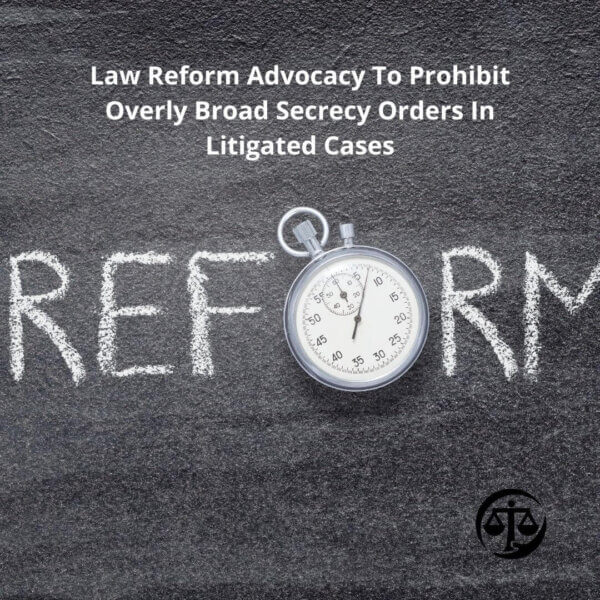
Law Reform Advocacy To Prohibit Overly Broad Secrecy Orders In Litigated Cases
By Don Resnikoff
Public Justice and other Washington, D.C. area public interest organizations are advocating for law reform to prohibit overly broad secrecy orders in litigated cases. One goal is legislation that will limit court entry of orders that permit parties to withhold and keep secret important consumer information without substantial justification. Several states have enacted “right to know” anti-secrecy laws that address the problem, including Florida, Louisiana, Montana, South Carolina, and Washington State. A California anti-secrecy law is being considered by legislators and may be adopted in the near future.
Neither the District of Columbia, Maryland, nor Virginia have such laws. The DC Consumer Rights Coalition, D.C. Bar Consumer and D.C. Affairs Communities/Sections, and others, plan to present a program this Summer in which attorneys representing Public Justice will advocate for local “right to know” law reform.
One model for such local advocacy is the California “Public Right to Know Act” which was recently passed by the California State Senate. As explained by Public Justice at https://www.publicjustice.net/california-senate-passes-public-right-to-know-act/, California Senate Bill 1149 would protect the public’s right to know the facts about dangerous public hazards that are discovered during litigation.
The Public Justice posting explains that the California “Public Right to Know Act”— would do the following:
- Create a presumption that no court order may conceal information about a defective product or environmental hazard that poses a danger to public health or safety unless the court finds that the public interest in disclosure is clearly outweighed by a specific and substantial need for secrecy.
- Prohibit settlement agreements that restrict the disclosure of information about a defective product or environmental hazard that poses a danger to public health or safety, and make any provision in an agreement void as against public policy, and thus unenforceable.
- Narrowly tailor its application to only information about a “danger to public health or safety” that is likely to cause “significant or substantial bodily injury or illness, or death.”
Sponsoring California Senator Connie M. Leyva explained that “Information about defects and hazards created by companies should never be hidden behind a veil of courthouse secrecy that can endanger the lives and safety of Californians . . . .The public must have access to this vital information so that they can decide—for themselves—how they can protect themselves and their families from these defective products or toxic hazards. It is unconscionable that any company would ever seek to keep critical information that can lead to injuries or even deaths from the public—and all because of their desire to keep making profits. I thank my Senate colleagues that voted for SB 1149 today, as they are standing on the side of the public by helping to prevent future injuries or deaths.”
The Public Justice posting explains that for decades, overly broad court protective orders have enabled companies to shield evidence of threats to public safety and other corporate wrongdoing. Consumers Union has for many years supported “right to know” legislation in California. Elisa Odabashian, Senior Policy Analyst with Consumers Union’s West Coast Office, made the following statement in 2000 in support of legislative proposals resembling the current SB 1149 that would limit secret out-of-court settlements in product defect, environmental hazard, unfair insurance claims practice or financial fraud lawsuits. “Many lives could be saved and much suffering could be averted if corporations were not allowed to use secrecy orders in court settlements to hide information about product defects, environmental hazards, or financial fraud.”
“The Firestone/Ford tire tragedies highlight how secrecy orders can have very serious consequences on public safety. Over the last decade–long before the recent recall of millions of Firestone tires sold largely on the popular Ford Explorer–there were 50-100 Firestone tire lawsuits. Most of these court cases were settled with secrecy orders in place that effectively kept information about the potential dangers associated with the tires from the public. According to the Detroit Free Press, to date, there have been 119 deaths and 500 serious injuries associated with Firestone tire tread separations. Many of these deaths and injuries could have been prevented if secret settlements had been barred.”
Further information will be forthcoming about the upcoming DC Consumer Rights Coalition, DC Bar Consumer and D.C. Affairs Communities/Sections program in which attorneys representing Public Justice will advocate for local “right to know” law reform.
Don Resnikoff is a member of Washington Council of Lawyers’ Advocacy Committee.






